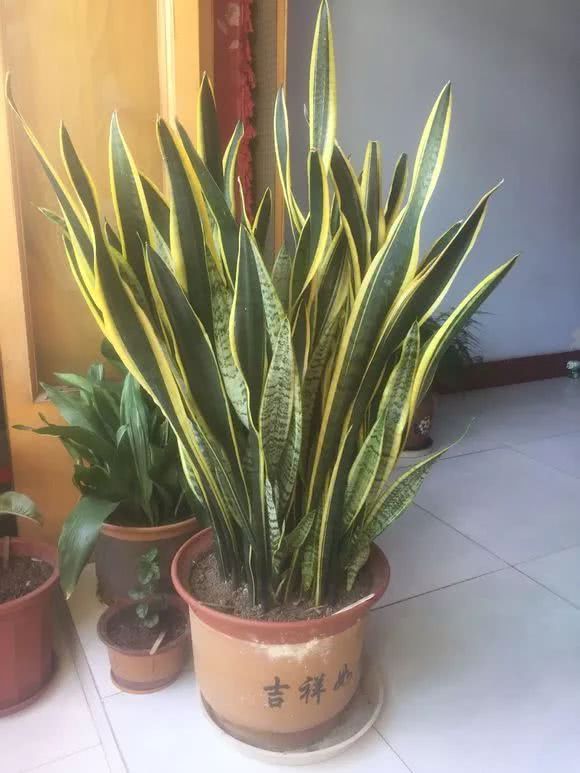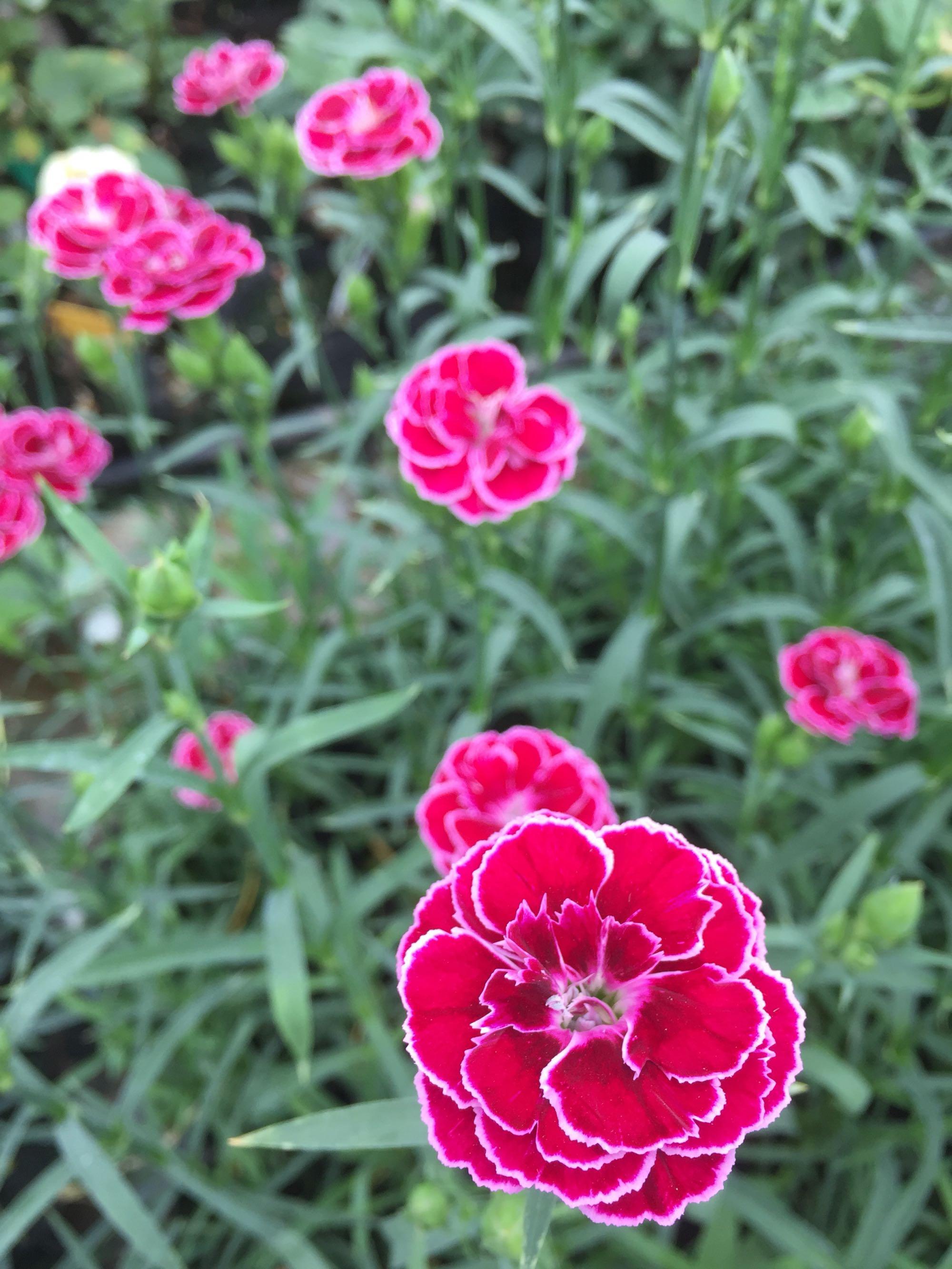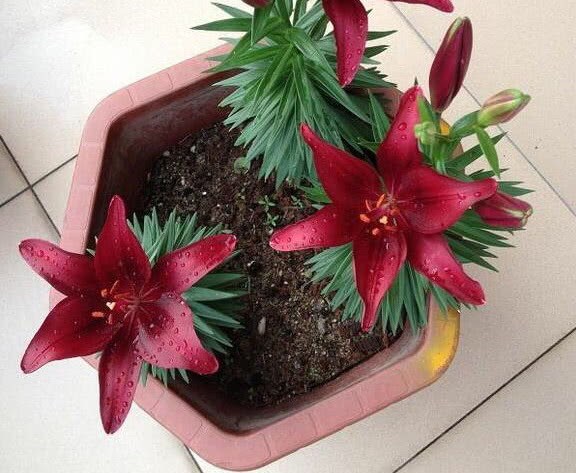Before November, hurry to change the pot and pour some self-made water leaves and thick roots to spend the winter.

Many flower friends' flowers in autumn, do not grow roots, old yellow leaves, some may also have some signs of rotten roots! In fact, autumn is the growing season for most flowers. If this happens, we should see what the problem is. In fact, many flower friends do not change pots, resulting in poor drainage of basin soil, impermeability, watering can not be drained, fertilizer can not be applied, resulting in longer and worse. You can change the pot for the flowers before November so that they can have a good winter. Let's have a look.
"
Change the pots of flowers. "
-Tiger tail orchid change basin-
Magnolia root system is relatively weak, not resistant to moisture, do not change the basin for a long time, the basin soil is easy to solidify and impermeable, resulting in rotten roots. In addition, after many years of cultivation, the roots grow a lot of small buds, and then lead to the whole plant is very crowded, airtight, more likely to cause rotten roots and rotten hearts. Tiger tail orchid can be changed in autumn to make it easier to survive the winter.
This pot of tiger tail orchid has been full of pots, there are still a lot of small buds below, there is not much room for growth, continue to affect the normal growth of tiger tail orchid.
First stop the water for a few days, let the basin soil of the tiger tail orchid dry, and then poke it along the edge of the basin with chopsticks, the tiger tail orchid will be easier to take off the basin.
If the new flowerpot is relatively large, you don't have to take it off, and the tiger tail orchid can continue to be used after trimming off the rotten roots. But if it is a smaller flowerpot, it is best to divide the tiger tail orchid into 2-3 parts and then plant it.
Cut the buds of the tiger tail orchid with a knife, divide the pots reasonably according to the size of the flowerpot, then apply plant ash or carbendazim powder to the wound, trim off the withered roots, remove a little of the old soil outside, put it in a cool and ventilated place to dry the wound.
Now put a few tiles on the bottom of the basin to facilitate drainage, you can put some broken bones or eggshells on the bottom of the basin, which will make the tiger tail orchid grow stronger. Then put the tiger tail orchid in, fill the soil, put it in a cool and ventilated place, water it a week later, and then maintain it normally.
After changing the basin, the tiger tail orchid grows very fast, the small buds rub long, and immediately become bigger several times.
-green pineapple to change pots-
Green pineapple grows fast, and its roots explode easily, and a large basin is full in a year. If you do not pay attention to changing the basin, the green radish root system is not only difficult to breathe, watering is difficult to drain, to the cold time, it is easier to rot the yellow leaves. Generally speaking, it is best to change the basin every 1-2 years, so that the green apple can grow fast and the root can be strong.
Although green pineapple is simple and easy to raise, we should also pay attention to the choice of basin soil, generally using rotten leaf soil, or using coconut bran and perlite as basin soil, it is not suitable to use too much sticky garden soil, green pineapple grows very fast in loose and breathable basin soil, and it is not easy to rot roots, and the management is very simple and convenient.
Some flower friends use this kind of clayey soil to raise green pineapple, it is difficult to grow several a year, the growth is very poor.
First stop watering the green apple, grasp the root of the green apple with your hand, pour it down, and the green apple comes out.
The flowerpot is a little bigger than the original pot, or 3-6 cm bigger than the green radish root crown, which is not good if it is too big. The old green turnip first cut off the old roots and rotten roots, retain the potted soil, and then put it into a new flowerpot with a thin layer of soil, fill the soil, water thoroughly, and put it in a cool place for about 1-2 weeks, then it can be maintained normally.
After the slow seedling, the green pineapple begins to grow normally, and if the temperature is not lower than 10 ℃, you can also pour some self-made rice water and fertilizer to the green pineapple. Amoy rice water will be collected, put in a plastic bottle, add a little orange peel, put in the sun, a few days later, add water diluted 10 times to irrigate green apple, grow fast.
-change the pot of longevity flowers-
Many flower friends' longevity flowers bloom less, or even do not blossom, which has something to do with not changing pots for a long time. There is no room for growth in the roots, and there is a lack of nutrients, and longevity flowers cannot make bricks without rice. Autumn is the season of flower bud differentiation of longevity flowers, and it is better to change pots with small pots in the original soil at this time, which will not affect the growth of longevity flowers and subsequent flowering.
Longevity flowers stop water for a few days, take longevity flowers out of the original pot, if there is already a bud, do not move the roots, just cut off some rotten roots and withered roots. If you do not already have a bud, you can cut off a layer of soil in the outer ring and retain 2 / 3 of the soil.
Prepare a new flowerpot, put some pebbles or ceramsite at the bottom, put the longevity flowers in, fill the soil, water thoroughly, put them in a cool and ventilated place, and after about 3-4 days, transfer to a place with plenty of sunshine for maintenance.
I was in high spirits after changing the basin.
After normal maintenance, what if the longevity flower should hit the bud, but do not see the bud for a long time? We can create an environment for flower bud differentiation.
Longevity flowers are short-day plants, and flower buds can only differentiate under short-day conditions, that is, 8 hours of sunshine. Find a large cardboard box, cover the longevity flowers, move out at 9: 00 in the morning, move in at 5: 00 p. M., and you will soon see the bud!
(source: sun, moon and stars 111)
-change the basin of the orchid-
The orchid grows rapidly, and the radish root will soon fill the bottom of the basin. Due to the depletion of nutrients in the basin soil, the growth was relatively thin in the second year, and there was no room for root growth, which was disadvantageous to the subsequent growth.
Stop watering 3-5 days before changing the pot, let the pot soil slightly dry to facilitate the removal of the pot, choose a suitable flowerpot, put ceramsite at the bottom, shovel off a layer of old soil around the original soil, cut off withered roots, old roots and rotten roots, fill the new pot with new cultivated soil, and plant the orchid into it.
Soybeans are rich in protein and are good nitrogen fertilizers. Calcium, magnesium and phosphorus in soybeans are very helpful to the growth of flowers and plants, so some bad soybeans or insect-bearing soybeans can be used as fertilizer. Soybeans do fertilizer, do not burn seedlings, but also conducive to the growth of flowers and plants. Cymbidium likes nitrogen fertilizer, and after the nitrogen decomposed by soybeans is absorbed and utilized, the leaf growth is more exuberant.
-the magnolia changes the basin-
After the orchid grows up, the flowerpot is too small, if it can no longer adapt to the root system development, it is necessary to change the pot. Cymbidium generally needs to change the basin once in 1-2 years, which is beneficial to the growth and development of Cymbidium.
The gentleman orchid stops water for 5-10 days first, so that the basin soil is relatively dry, which can reduce the root injury and recover quickly. Cut off some of the old roots, rotten and hollow roots, and the healthy roots should be kept.
Pot bottom pad drainage tiles, put some large pieces of rotten leaves and base fertilizer, fill the root sinus with cultural soil into the basin, filled with soil compacted, watered. Keep it in the shade for 1-2 weeks. After the recovery of vitality, it can be transferred to a normal place for maintenance.
Gentleman orchid likes fertilizer, when changing pots, you can stir-fry soybean cake, castor seeds, soybeans, sesame seeds, and other oil crops, and sprinkle a little to make base fertilizer or waist fertilizer, which is conducive to bright leaves and more flowering.
-get rich and change pots-
The meaning of a rich tree is good, but it is not easy to raise. Most of the time, the yellow leaves will rot and the roots will die. The roots of the rich trees are weak, and the soil that raises the rich trees must be loose, ventilated and drained well, otherwise the roots will rot easily. When flower friends go to the flower market to buy flowers, they should see what the potted soil looks like. If it is as hard as stone, do not buy such a rich tree. It will not last long to buy it back.
If you accidentally buy a fortune tree of this kind of soil, you should change the pot in time. To raise the rich tree, it is generally necessary to change the basin every 1-2 years to prevent the drainage and permeability of the soil from getting worse, resulting in the rotten roots of the rich tree. In the process of rich tree maintenance, if rotten roots are found, they should also be removed in time to deal with rotten roots, so as not to continue to spread and lead to the death of rich trees.
The rich tree will stop water for a week to remove the surface soil and be careful not to damage the roots. But if there is rot, remove it and sprinkle it with carbendazim powder. if the area is large, cut off all the rotten roots, soak them in potassium permanganate or carbendazim solution, dry them and then serve them.
Raise wealth tree do not use pure nutrient soil, to add some particles, such as coarse sand or volcanic stone, so that basin soil drainage performance is better. At the beginning of the pot, do not bury it deeply, plant it shallowly, and do not bury all the roots in the soil. After the slow seedling is ready, slowly increase the filling. After changing the basin, do not immediately water it, keep it in a cool place for a few days and then water it. After putting on the basin, you should pay attention to ventilation and keep it in a semi-shady place.
-asparagus changes pots-
Asparagus had better change the basin every one or two years, it can be changed in the spring and autumn, cloudy or sunny evening is the best time to change the basin. It is best to stop watering 2-3 days before changing the basin, so as to facilitate the removal of the basin.
The new soil for cultivating asparagus does not need to add too much fertilizer, just mix it with rotten soil and fine sand to make base fertilizer. In order to make the soil more breathable, tiles or stones can be placed on the bottom of the basin.
The roots of asparagus are closely combined with the soil, so be careful not to hurt the roots when changing pots. Use a small piece of wood to slowly enter the soil along the edge of the basin, and then make a circle along the basin to separate the soil with roots from the basin.
Cut off the old and rotten roots, and move the "soil balls" formed by the roots and the soil together to the old or new basins. If you use the old basin, it is OK to change the soil. If you change a larger basin, you only need to be about 1 big 3 bigger than the old one.
After planting, trim off some old leaves, water them thoroughly, and put them in a cool and ventilated place.
-wind and rain orchid change basin-
The orchid blossoms beautifully, is simple and easy to raise, and has strong adaptability. it can grow well without any tube, but the root system of the orchid grows vigorously, and the side ball will soon be full, and it will be very crowded if you don't change the pot for a year or two, and there is a risk of rotten ball. so it's best to change the basin every 1-2 years, even in the spring and autumn.
Wind and rain orchid stop water for a few days, take off the basin and get rid of some of the original soil. If you plant too many balls, you can divide them into pots, usually 20-30 cm in pots, about 5-6, so that they will not be crowded, and the side balls can continue to burst later.
Turn over the pot for these flowers
Let them accumulate nutrients.
Fill the balcony tomorrow.
Show it to the flower friends who need it.
- Prev

A kind of cold-resistant potted flower can be raised and planted in the north, and it is easy to grow beautiful flowers.
Guide green potted plants is a necessary embellishment of home life, raising some flowers and plants at home, many benefits, not only can beautify the room, but also happy mood. Huasheng potted Plant Diary No. 1398 takes you to know a kind of super cold-resistant flower. Lord of the day.
- Next

You don't have to buy fertilizer to grow flowers, pick up some of these things, throw them in the pot, rub the flowers, grow and blossom.
Potted plants can make the balcony room more beautiful, growing flowers is a fun thing in the process, just like taking care of your pets, watering and fertilizing, everything is serious, immersed in the joy of labor. A florist.
Related
- Wuhan Hospital Iron Tree Blooming Result Was Instantly Frightened by the Gardener Master
- Which variety of camellia is the most fragrant and best? Which one do you like best?
- What is the small blue coat, the breeding methods and matters needing attention of the succulent plant
- Dormancy time and maintenance management of succulent plants during dormancy
- Minas succulent how to raise, Minas succulent plant pictures
- What are the varieties of winter succulent plants
- How to raise succulent plants in twelve rolls? let's take a look at some experience of breeding twelve rolls.
- Attention should be paid to water control for succulent plants during dormant period (winter and summer)
- Watering experience of twelve rolls of succulent plants
- Techniques for fertilizing succulent plants. An article will let you know how to fertilize succulent plants.

